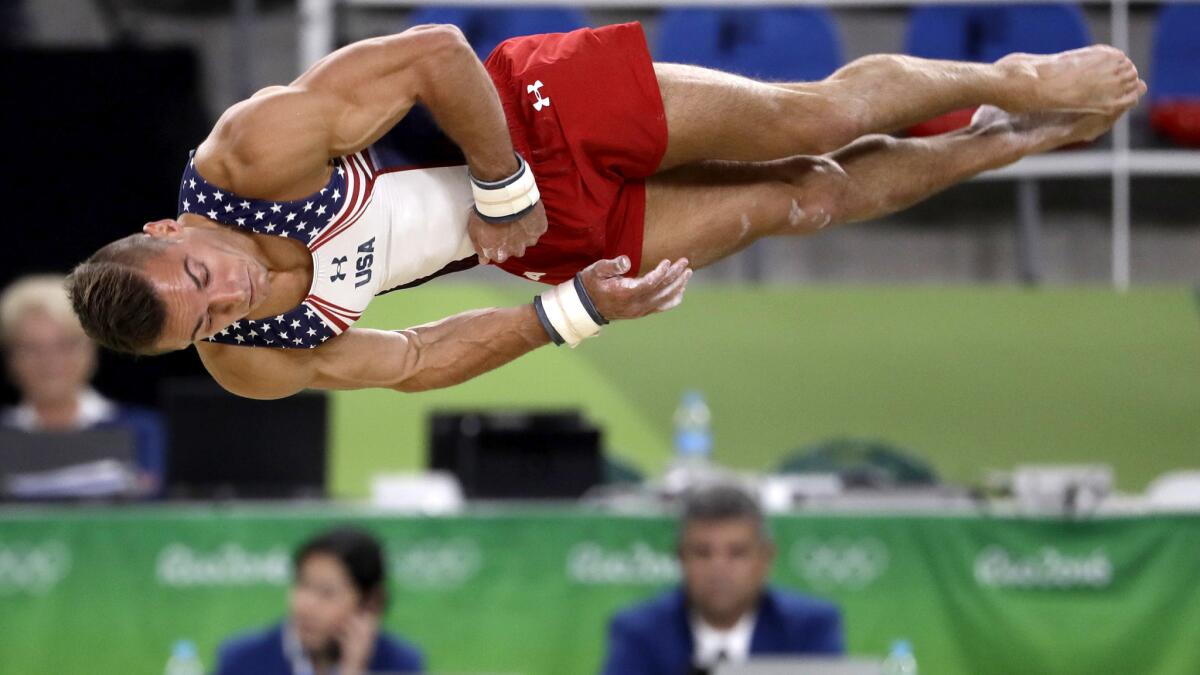U.S. men falter early in gymnastics team final and fail to medal again

- Share via
Reporting from Rio de Janeiro — His first instinct was an apology. Sorry was the first thing gymnast Danell Leyva had to say to his U.S. Olympic teammates Monday night during the men’s team final.
Leyva fell near the end of his high-flying and often-spectacular high-bar routine on what was one of the easier moves and the chance of making the podium — already microscopic — vanished into the Rio Olympic Arena air.
“Immediately, I went to apologize to them and they said, ‘No, no, no, we don’t want to hear that. You did everything you could. You left it out there and you finished strong,’” Leyva said.
Accountability was admirable, as was his instinct, but it was misplaced. It was essentially over after one rotation for the American gymnasts.
They stumbled in the floor exercise — eighth in the eight-team field after the opening rotation. It was far too much ground to make up as the U.S. ultimately had the same result as it did four years ago in London, finishing fifth.
Japan survived a slow start to win gold and was joined on the podium by Russia and China. The silver medalist Russians were sixth in 2012. Japan, led in Rio by star gymnast Kohei Uchimura, had not won the men’s team event since Athens in 2004.
“I’m obviously still going to feel like it’s my fault,” Leyva said. “I was the last routine and I should have hit no matter what.”
In the lead-up to the Olympics, the U.S. men spoke about avoiding the same mistakes as four years ago. In 2012, they were first after qualifying.
They were in second this time around and the jitters apparently got to them on the floor exercise. Alex Naddour got into trouble on his last tumbling pass and scored 13.566. Next up was Sam Mikulak, of Newport Coast, who went out of bounds twice on his floor routine and scored 14.866.
“I didn’t think nerves really got to me,” Mikulak said. “Sometimes you go out of bounds, and sometimes you don’t. That’s just how it is.”
Said Naddour: “I really don’t know what happened, honestly, it happened so quick. My legs felt a little bit tired. So I rushed the twist, normally I do a full out and I did a full in and kind of got lost.
“I tried to do my best, do a skill I haven’t really done and try and land it. That just kind of happens in this sport.”
Teammate Jake Dalton was the only one of the three to get through the floor routine without incident.
“Might have been some nerves for the first event,” he said. “The floor is definitely different than the one we all train on at home. But we had time to try and adjust. When you’re a little bit more nervous there’s a little more bounce to the floor.
“We picked things up and kept it rolling.”
Things got better as the meet evolved but one good half wasn’t going to be enough. After the pommel horse — which was an issue in preliminaries — they moved to seventh place after two rotations and got to fifth place after the fifth apparatus, the parallel bars.
Mikulak and teammate Chris Brooks were doing their best to light an emotional fuse. It was starting to look like an NCAA collegiate meet, not the Olympics.
Then came the final nervy rotation. Britain’s Louis Smith went with a tougher-than-planned routine and fell off the pommel horse, and Britain placed fourth. Denis Abliazin of Russia stepped out of bounds on his floor routine, as did his teammate David Belyavskiy.
Mikulak scored 15.000 on the high bar, followed by Brooks, who got a 15.108 despite a small hop on his dismount. Leyva was the final U.S. gymnast to go and he went after his routine aggressively and fell near the end of it after earlier executing the toughest moves.
Gutted best described how Leyva felt. He was named an alternate after the Olympic trials in July and made the team after John Orozco tore his knee ligaments.
“I just caught the bar wrong,” Leyva said. “My grip really wasn’t on the bar. I really tried hanging on. I really did. I just slipped off the bar. That never happens. I don’t know how it happened. I can’t tell you what I did.”
His stepfather and coach Yin Alvarez later told him that he reached in too quick.
What was Leyva thinking after he fell?
“Disbelief. Shock. Obviously disappointment, I didn’t know what happened,” he said.
Leyva was a bronze medalist in the all around in 2012 in London and still has two individual events remaining at the Olympics, the high bar and the parallel bars.
He had handled adversity before, though, of a much different nature. His training before nationals was curtailed when he tried to break up a fight between his two bulldogs in May, leading to some deep wounds on his lower calf.
Monday was going to be tough to leave behind but Leyva was doing his best.
“That’s it,” he said. “There’s nothing I can do about that routine anymore.”
Twitter: @reallisa
MORE SPORTS NEWS
Ledecky doesn’t disappoint, continues to make swimming history
Brazilians slowly warming to Olympic fever
Yasiel Puig’s first day in triple-A purgatory: three RBIs, and watching the Dodgers on television
More to Read
Go beyond the scoreboard
Get the latest on L.A.'s teams in the daily Sports Report newsletter.
You may occasionally receive promotional content from the Los Angeles Times.





